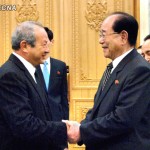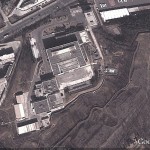According to the Donga Ilbo:
About 10,000 tons of fruit have been exported every year to North Korea via the Chinese city of Dandong in Liaoning Province, which borders the North at the estuary of the Yalu River.
Fruit imports for the North`s elite have reportedly posted double-digit growth over the past five years despite severe food shortages in the Stalinist country.An informed source in Dandong said Monday, “About 10,000 tons of fruit were exported to North Korea via Dandong Marine Center last year,” adding, “They were worth 100 million yuan (16 million dollars).”
Shipments to North Korea have grown about 15 percent per year on average over the past five years, the source said.
Fruits exported to the North include the different varieties available in China, including subtropical and tropical types such as bananas, pineapples, litchis, dragon fruit and durians as well as apples, tangerines and watermelons.
The source said fruit exports surge just before major North Korean holidays, including Feb. 16 (the birthday of the late North Korean leader Kim Jong Il) and April 15 (the birthday of North Korea founder Kim Il Sung).
“Fruit exports significantly increased ahead of Christmas Day in the past, but there was no notable change in exports last year due to the death of Kim Jong Il,“ the source said.
North Korea does not celebrate Christmas but fruit exports usually increased because Dec. 24 marks the birthday of Kim Jong Il’s biological mother Kim Jong Suk. The shipments are sent to Pyongyang for use at events or consumed by the power elite. Payment is made mostly with U.S. dollars, but the yuan is often used to settle accounts.
The Dandong city government also established an agency in charge of fruit exports to the North. Liaoning Province announced on its website Thursday that a center for market purchase of exported fruits for border area trading was set up in Dandong.
The purpose of the market is for Dandong to supply fruit to meet growing demand in North Korea, and assure the quality and safety of them.
Furthermore, the agency aims to manage chaotic fruit export markets for North Korea. In Dandong, a number of fruit stores targeting trade with the North rather than sale to residents are reportedly operating.
One fruit vendor said, “We`re shipping fruit via vehicles that regularly travel back and forth to and from Shinuiju and Dandong.”
The center is designed to control and manage the overall fruit export market to the North, including fruit exports by such small merchants. From now on, all fruit exports to North Korea will be reportedly be sent through this center.
The center is a subsidiary of Dandong Guopin Co. Ltd., a state-run company established by Dandong. It has a system worth 10 million yuan (16.4 million dollars) designed to enhance capacity in sorting, refrigeration, packaging, inspection and transport of fruits.
The center has taken charge of about half of fruit shipments from Dandong to North Korea every year, and its office is in Dandung Marine Center.
Read the full story here:
Chinese city exports $16 mln worth of fruit to N.Korea yearly
Donga Ilbo
2012-2-6


